|
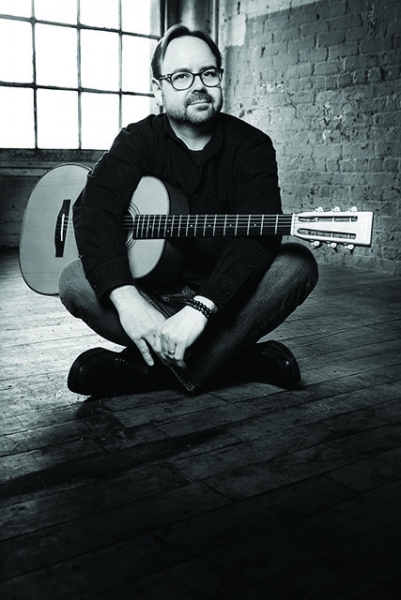
Vin Downes
Visit Vin's website
Vin Downes on Facebook
Vin Downes on Spotify
Vin Downes on Twitter
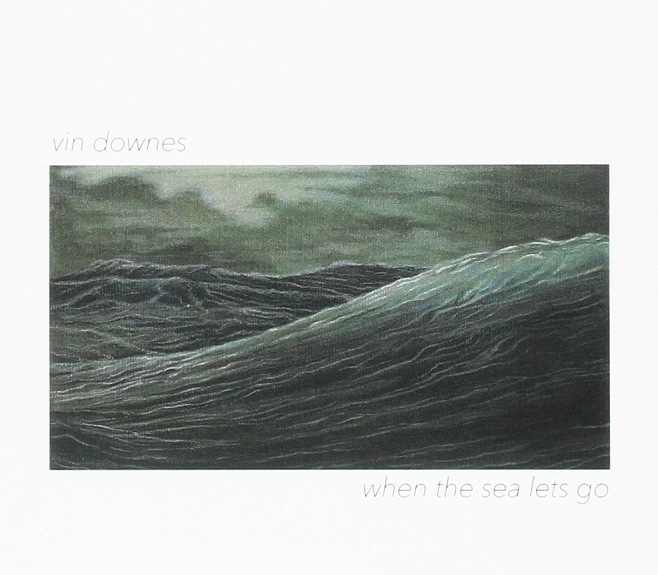
When the Sea Lets Go
|
|
AV: Instead of asking you about what drew you to the guitar I'd like to ask what is it about music in general that resonates with you, draws you to it and what would be missing from your life if you didn't have music in it?
VD: I remember when I was very young, I would listen to music with my mother…Beatles, John Denver, Mammas and the Pappas…and I always felt a physical connection to music. There was something tangible in the melodies and harmonies for me. That feeling seemed to get stronger as I grew older, until it only seemed natural to start playing an instrument so I could make those sounds myself.
AV: You started studying the guitar when you were eleven years old. Electric guitar at that. What were your aspirations in regards to playing the electric guitar, instrumental or perhaps rock?
VD: When I was young, most of my friends were a couple years older than me and they were listening to Ozzy Osbourne, AC/DC, Led Zeppelin and the Rolling Stones. I was immediately drawn to the sound of the electric guitar. Ozzy’s guitarist, Randy Rhoads, was my favorite. I was entranced every time I listened to those records…I still am. I went to my first concert when I was ten years old. It was to see Ozzy Osbourne on his Diary of a Madmen tour. I knew right away that I needed to learn how to play the guitar.
As I got older, I was interested in Rock, Heavy Metal, blues and jazz. I spent my teenage years playing in bands and trying to learn various styles of electric guitar playing.
AV: So what was it about David Cullen's song Along the Way that hooked you and changed your musical direction so quickly and so completely?
|
|
VD: I was in high school and studying music. I had taken theory classes and I was playing with the school jazz band. My teacher, David Watson – who was also a professional touring musician, was expanding my ears by having me listen to various styles of music. I started to learn some classical guitar technique so I was looking for more acoustic based guitar music to check out.
Around that time, I had read an article in Guitar Player magazine about Michael Hedges and Windham Hill Records. It peaked my interest, so I went out and bought two albums – Michael Hedges Live on the Double Planet and a Windham Hill Guitar Sampler. When I got home, I listened to the Sampler first. The opening track was David Cullen’s “On the Way”.
When I heard the opening notes, something clicked in my ears and brain, like a light switch was turned on. I couldn’t believe that this was one guitar, but more importantly, it was the first time that I was less interested in the guitar itself, but rather it was the music composition that I couldn’t get enough of. I remember feeling a physical reaction to the music I found on that record, and all the records by Hedges, Ackerman and deGrassi.
That was the moment that I realized that I wanted to compose. Fingerstyle acoustic guitar would be the vehicle for my compositions because it was like having an orchestra in your hands. I loved the timber of the guitar and it’s endless possibilities with alternate tunings. You could do so much more than a guitarist with just a pick playing a guitar in standard tuning. There was no turning back for me from that point on.
|
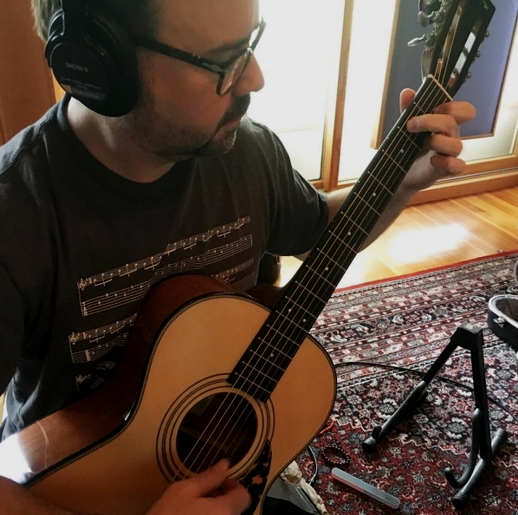
|
AV: Not everyone studies their chosen musical instrument and earns a degree like you did from William Paterson University in classical guitar performance. What is it that you take away from those studies and how did it shape the music you created from that point on?
VD: I took lessons from the first day I started playing guitar at age 11. I loved knowing how to read music and understanding music theory. I studied it all the way through high school. I decided in my junior year that I wanted to become a professional musician, and that I also wanted to be able to teach music as a career. This was a direct influence from my high school teacher, David Watson. I began studying classical guitar with Gary Oberwanowicz my senior year to prepare for college.
Earning a music degree helped me to become an all around better musician, which was always my goal. I never wanted to just be a guitarist. I want to be a musician who happens to play the guitar. While in college studying classical guitar performance, I also studied composition, performed contemporary 20th Century music with the NJ Percussion Ensemble, and studied Indian table. All of this helps me to think and play like a musician, and not just a guitar player.
|
AV: Everyone is familiar with a guitar as a musical instrument having been exposed to them for years but perhaps you can explain the difference between what most of us have heard all our lives and the fingerstyle music that you play, how it's different and why it's more difficult to master.
VD: Fingerstyle technique allows the performer to be his or her own little orchestra. Plectrum guitarists typically play one note at a time, or strum multiple notes, creating a very distinct sound. The fingerstyle guitarist uses four fingers, sometimes all five fingers, of the right hand to play melody and harmony together simultaneously. This allows the player to create, and play their own accompaniment underneath or above melodies, much like a pianist.
|
AV: Artists have different reasons for releasing their music to the world. Tell me about the motivations that led to your decision to seek out a record label and put your music out in the public sphere.
VD: I had always composed, but had lots of half written songs. I wasn’t recording anything or performing at all until 2009. I was just focusing on teaching. That changed when I had the opportunity to meet and hang out with one of my favorite musicians, blues guitarist and songwriter, Kelly Joe Phelps. We had a conversation about process versus product. This conversation changed my entire philosophy on how I approached writing. I was always stuck on thinking I had to write music that sounded like something else instead of just writing and developing my own voice.
After that conversation, my creative output seemed to soar. I wrote an album’s worth of music in a few months and decided that now was the time to record it and put it out there. It still wasn’t my own true voice yet, but I was on my way to finding it. (That would happen when I met Will Ackerman and Tom Eaton). I released “Skies and Openings” in 2009, and it received great reviews and feedback. That motivated me to keep at it. It was the best decision I ever made. I am so grateful for Kelly Joe Phelps sharing his wisdom with me... changed my life.
AV: I've seen a lot of articles as of late about how the rise of digital music, streaming and MP3's has led to a devaluing of music. In terms of what you and those you work with have experienced in this new digital frontier do you feel that your music has lost some of its intrinsic value in the eyes of those who in times past would have purchased an album or a CD?
|
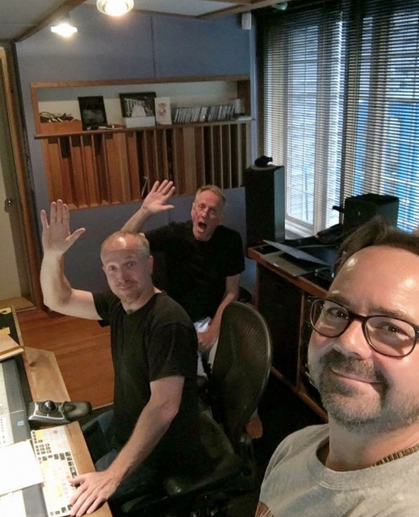
Vin Downes, Tom Eaton and
Will Ackerman in the back
|
VD: Streaming has changed the way people access and experience music. Working with high school students, I can see how a whole generation that only knows streaming. They don’t even download music. If they do occasionally download music, it’s only one or two songs/singles. Younger generations don’t listen to whole albums. Technology has changed the way we interact and listen to music. This for me is very sad. Looking at an album cover while listening to an entire album from start to finish was all part of the experience of connecting to the artist and the music.
For the artist, it is very difficult to make any money from your recordings now. There are artists that do well with streaming, but it’s requires a ton of hustle…and that’s lots of time that could be spent making more music! It requires hundreds of thousands of streams to see any real financial reward. Streaming does get you to the ears of the whole globe instantly, but if those listeners aren’t also buying your CD or download, you’re not going to be compensated properly for your art. And right there is the dangerous part…when an artist isn’t compensated for his or her art, their art is devalued. They are devalued. It’s hard to keep making music/art when that happens.
If you use streaming sites, you can still make sure you support your favorite artists. Buy/download their CD, go to their concerts, buy merch.
|
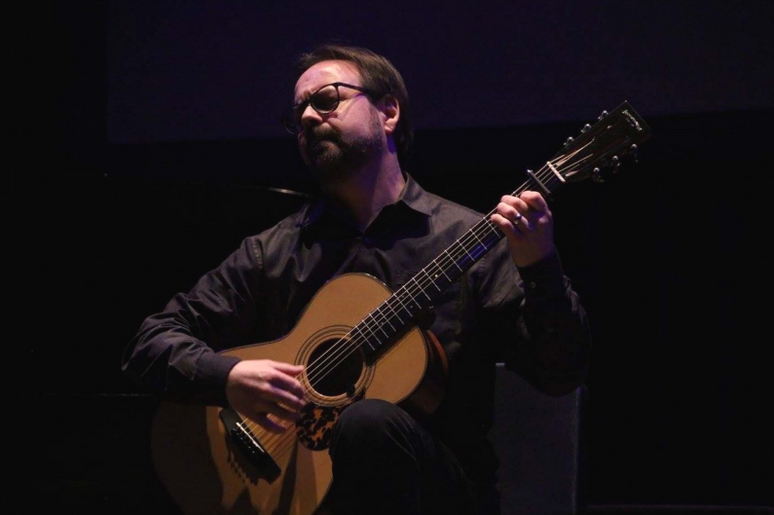
|
AV: You were greatly influenced by the artists of Windham Hill Records so tell me about how you came to the attention of Will Ackerman and Windham Hill Records and how you felt about having Will Ackerman produce a couple of your albums.
VD: In 2011, I realized that guitarist David Cullen lived in Reading, PA, which is only a couple hours from where I live in NJ. David was the first guitarist I heard on a Windham Hill sampler when I was in high school and was an enormous influence on me. I reached out to David to see if I could take a lesson with him. After the lesson, we stayed in touch via email.
About six months later, I received an email out of the blue from Will Ackerman inviting me to contact him about the possibility of recording with him at Imaginary Road Studios. I did not respond to the email initially, because I thought it was spam or an advertisement for the studio. Plus, I didn’t think that there was any way I would be able to record at IRS.
|
I eventually did reply to the email saying that I was interested in learning more about the possibility of recording at IRS, and Will responded to me within minutes saying he liked my music and was interested in talking about working together. We talked via email and set up a time for me to come up to the studio to meet with him and Tom Eaton and see what happens.
The meeting was very much like a job interview. Will and Tom take great pride in the work they do and have very specific requirements for artists that they work with. Luckily for me, things clicked and so began a wonderful professional partnership for me with Will and Tom, as well as strong friendships.
AV: What has each subsequent album you created taught you about your music and where you want to go with it going forward?
VD: I think that it has taught me that I do have my own musical voice. There are countless influences in there, but I think they come out as being me.
I am always trying to write an album of great music for guitar. I am really not interested in the ‘guitar’ part of that statement as I am in the
‘writing great music’ part. I want the listener to be moved by the music and not even realize that it happens to be played by a guitar. For me,
it’s always about writing great melodies.
Going forward, there are other things I would like to try as well. I recently performed some duets live with Heidi Breyer, and we immediately talked about writing and recording a duet album. I also performed in an ambient/improvisational trio called Departure with my good friends Tom Eaton and Jeff Oster. I had the chance to play some electric guitar with that. That was great fun!
I am also contemplating the idea of composing some fingerstyle compositions for electric guitar. We’ll see….
|
AV: What is The Gathering - A Concert Series about and how did you become involved in it?
VD: The Gathering Concerts are concerts presented by Will Ackerman that feature himself along with artists that he and Tom Eaton have produced at Imaginary Road Studios. Essentially, this is the new Windham Hill, which is something recognizable to countless people and fans. This is the same passion and work that Will did with his Windham Hill artists.
The concerts feature solo and ensemble performances usually by three artists and Will. I have been playing concerts with Will since 2014. When David Cullen was unable to perform as much, Will asked me if I would consider being his sideman at concerts. You can imagine how incredibly humbled and excited I was by that opportunity!
It has been an absolute joy performing with Will and so many of the incredibly talented musicians of the Gathering family.
|
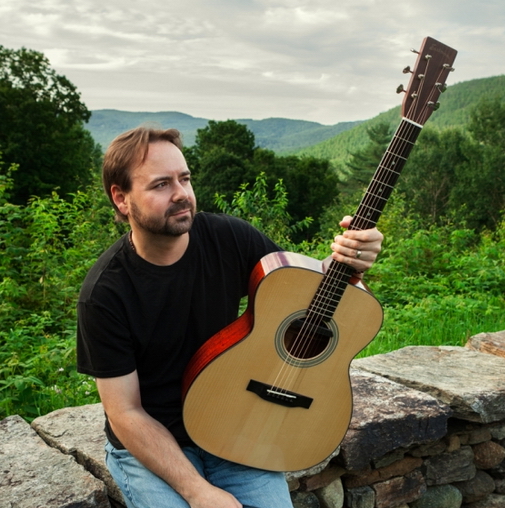
|
AV: Having just seen you at the Carnegie Hall performance of FLOW, which was great by the way, how do you feel about the opportunities to perform live with Will Ackerman in a situation like this? Do you improvise or play off one another in these situations or do you stick pretty much to the song as written?
VD: Playing with Will is a dream come true for me. I still look up at him on stage during a performance and think…is this really happening?
When we perform together, we are playing duet arrangements of his pieces. Sometimes there is some improvisation, where Will or I will solo… like during Hawk Circle or Last Day at the Beach. Even if there is no improvisation, each performance is different in nuance or expression.
Getting to play these songs in concert with Will is a surreal and magical experience every single time. There is no feeling in the world like creating a musical conversation with someone, especially when that someone is Will Ackerman.
|
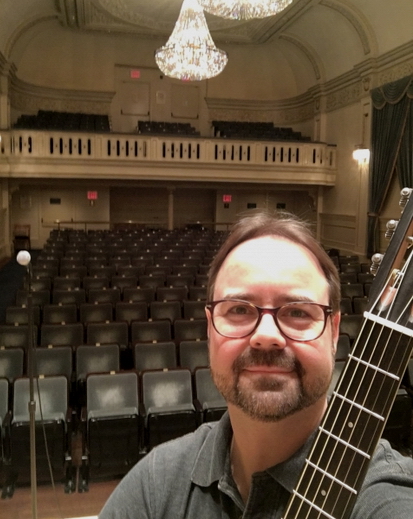
Vin Downes selfie at Weill Recital Hall
at Carnegie Hall
|
AV: How do you feel about live performances in general? What do they offer you that you can't get in recording your music in a studio?
VD: Performing live is great fun. It’s the feeling of walking the tightrope. You never know what’s going to happen. It allows the artist to interpret and react to the music in the moment. There is an indescribable feeling created by communicating and emoting to an audience through music.
AV: Tell me about Riverwide Records and how you came to be associated with the label.
VD: Riverwide is a very small label run by Tom Eaton. There are only a few artists in his catalog. These are artists that Tom has worked with in the studio and took a very strong liking to their music. Tom is one of my favorite people on the planet. We share a lot of the same musical sensibilities and really work well together. I am honored that he asked to add me to his label.
AV: Finally as a teacher of classical guitar in a high school setting what are your thoughts on the ability of music to alter the trajectory of children's lives and offer them something to anchor their lives to as they move into adulthood?
|
VD: My high school music teacher changed my life. We are still very good friends to this day. Having the opportunity to pay forward what he gave to me is priceless. Watching students have those light bulb moments when they discover their own personal connection to music, just like I did when I was their age… well, that’s what it’s all about.
AV: Thank you for taking the time out and squeezing this interview into your busy and schedule and sharing with your fans your love of music through your answers here. And thanks for a wonderful performance at Carnegie Hall that I was privileged to be able to attend. May your love of music never diminish and may it burn ever brighter in the years to come.
|